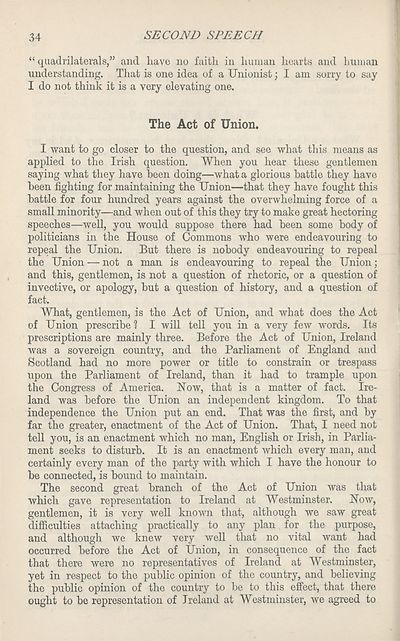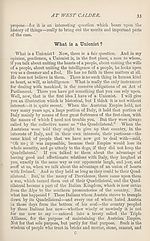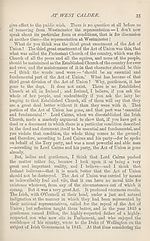Download files
Complete book:
Individual page:
Thumbnail gallery: Grid view | List view

34
SECOND SPEECH
“ quadrilaterals,” and have no faith in human hearts and human
understanding. That is one idea of a Unionist; I am sorry to say S
I do not think it is a very elevating one.
The Act of Union.
I want to go closer to the question, and see what this means as
applied to the Irish question. When you hear these gentlemen
saying what they have been doing—what a glorious battle they have
been fighting for maintaining the Union—that they have fought this
battle for four hundred years against the overwhelming force of a
small minority—and when out of this they try to make great hectoring
speeches—well, you would suppose there had been some body of
politicians in the House of Commons who were endeavouring to
repeal the Union. But there is nobody endeavouring to repeal
the Union — not a man is endeavouring to repeal the Union;
and this, gentlemen, is not a question of rhetoric, or a question of
invective, or apology, but a question of history, and a question of
fact.
What, gentlemen, is the Act of Union, and what does the Act
of Union prescribe? I will tell you in a very few words. Its
prescriptions are mainly three. Before the Act of Union, Ireland
was a sovereign country, and the Parliament of England and
Scotland had no more power or title to constrain or trespass
upon the Parliament of Ireland, than it had to trample upon
the Congress of America. How, that is a matter of fact. Ire¬
land was before the Union an independent kingdom. To that
independence the Union put an end. That was the first, and by
far the greater, enactment of the Act of Union. That, I need not
tell you, is an enactment which no man, English or Irish, in Parlia¬
ment seeks to disturb. It is an enactment which every man, and
certainly every man of the party with which I have the honour to
be connected, is bound to maintain.
The second great branch of the Act of Union was that
which gave representation to Ireland at Westminster. Now,
gentlemen, it is very well known that, although we saw great
difficulties attaching practically to any plan for the purpose,
and although we knew very well that no vital want had
occurred before the Act of Union, in consequence of the fact
that there were no representatives of Ireland at Westminster,
yet in respect to the public opinion of the country, and believing
the public opinion of the country to be to this effect, that there
ought to be representation of Ireland at Westminster, we agreed to
SECOND SPEECH
“ quadrilaterals,” and have no faith in human hearts and human
understanding. That is one idea of a Unionist; I am sorry to say S
I do not think it is a very elevating one.
The Act of Union.
I want to go closer to the question, and see what this means as
applied to the Irish question. When you hear these gentlemen
saying what they have been doing—what a glorious battle they have
been fighting for maintaining the Union—that they have fought this
battle for four hundred years against the overwhelming force of a
small minority—and when out of this they try to make great hectoring
speeches—well, you would suppose there had been some body of
politicians in the House of Commons who were endeavouring to
repeal the Union. But there is nobody endeavouring to repeal
the Union — not a man is endeavouring to repeal the Union;
and this, gentlemen, is not a question of rhetoric, or a question of
invective, or apology, but a question of history, and a question of
fact.
What, gentlemen, is the Act of Union, and what does the Act
of Union prescribe? I will tell you in a very few words. Its
prescriptions are mainly three. Before the Act of Union, Ireland
was a sovereign country, and the Parliament of England and
Scotland had no more power or title to constrain or trespass
upon the Parliament of Ireland, than it had to trample upon
the Congress of America. How, that is a matter of fact. Ire¬
land was before the Union an independent kingdom. To that
independence the Union put an end. That was the first, and by
far the greater, enactment of the Act of Union. That, I need not
tell you, is an enactment which no man, English or Irish, in Parlia¬
ment seeks to disturb. It is an enactment which every man, and
certainly every man of the party with which I have the honour to
be connected, is bound to maintain.
The second great branch of the Act of Union was that
which gave representation to Ireland at Westminster. Now,
gentlemen, it is very well known that, although we saw great
difficulties attaching practically to any plan for the purpose,
and although we knew very well that no vital want had
occurred before the Act of Union, in consequence of the fact
that there were no representatives of Ireland at Westminster,
yet in respect to the public opinion of the country, and believing
the public opinion of the country to be to this effect, that there
ought to be representation of Ireland at Westminster, we agreed to
Set display mode to:
![]() Universal Viewer |
Universal Viewer | ![]() Mirador |
Large image | Transcription
Mirador |
Large image | Transcription
| Antiquarian books of Scotland > Politics & government > Political speeches in Scotland in 1890 > (38) |
|---|
| Permanent URL | https://digital.nls.uk/126568746 |
|---|
| Description | Thousands of printed books from the Antiquarian Books of Scotland collection which dates from 1641 to the 1980s. The collection consists of 14,800 books which were published in Scotland or have a Scottish connection, e.g. through the author, printer or owner. Subjects covered include sport, education, diseases, adventure, occupations, Jacobites, politics and religion. Among the 29 languages represented are English, Gaelic, Italian, French, Russian and Swedish. |
|---|

